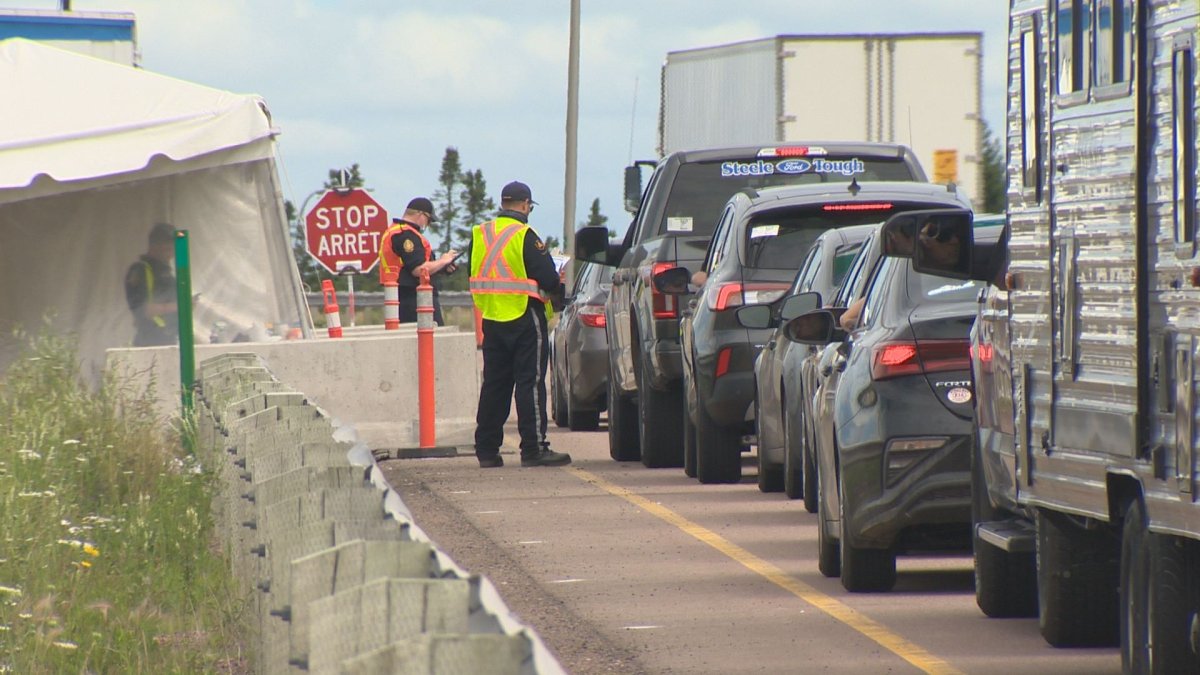While registration is mandatory for anyone entering New Brunswick, some drivers are still being waved through without being screened when wait times grow too long.

The practice began when the Atlantic travel bubble was put in place and wait times to enter the province exploded.
According to a spokesperson for the department of safety, peace officers are still permitted to ease restrictions to keep traffic moving.
“In instances where traffic is heavy, long wait times occur, causing highway safety concerns. In these instances, peace officers will relax controls as necessary to maintain public safety, and restart after a few minutes,” said Coreen Enos in an emailed statement.
“The situation at busy entry points is fluid, with ebbs and flows of traffic. It’s not unusual to have traffic moving slowly, nor to have it moving freely.”
Follow-up questions about what is being done to ensure that people are filling out the required forms or are residents of Atlantic Canada when being waved through did not receive a response.
According to New Brunswick’s website “everyone entering New Brunswick by land, air or sea must register so information can be collected to support Public Health.”
Liberal leader Kevin Vickers says it makes no sense to have a hard border one minute, with people being waved through the next.
“There’s an issue here in New Brunswick that has to be addressed,” he said.
“To have the border there and be doing all these checks and then every couple of hours or so wave through large amounts of drivers seems to take away any credibility of having the border control there.”

Vickers says the inconsistencies along with the long waits that have been decried by essential workers and mayors on both sides of the border shows that the current system is not working.
He says this is the latest instance in a pattern of poor policy implementation by the government during the pandemic, raising the example of ATV trails being initially open before being closed the next day and when it was announced that masks would be mandatory inside public spaces, only to be reversed shortly after.
Premier Blaine Higgs was not made available for an interview on Monday.
Vickers also said that Nova Scotia and Prince Edward Island do not seem to be having the same issues at the border as New Brunswick.
- ‘Shock and disbelief’ after Manitoba school trustee’s Indigenous comments
- Invasive strep: ‘Don’t wait’ to seek care, N.S. woman warns on long road to recovery
- ‘Super lice’ are becoming more resistant to chemical shampoos. What to use instead
- Canadian food banks are on the brink: ‘This is not a sustainable situation’
P.E.I. is asking people to pre-register before showing up at the border.
At the Amherst road border, Nova Scotia conservation officers are supposed to check that people are residents of one of the Atlantic provinces, but there have been reports of drivers being waved through without being stopped.
A spokesperson for the Nova Scotia government did not answer questions about the process conservation officers are supposed to follow at the land border.
“Our focus at the border is ensuring that those from outside the Atlantic Provinces understand the requirement to self-isolate,” said Marla MacInnis in an email.

Those coming from outside the Atlantic bubble are being asked to pre-register in order to allow daily check-ins to ensure they are self-isolating for a full two weeks.
McInnis said that calls are being made, with a priority focus on those coming from outside the country.
“Provincial staff work to contact them each day of their 14-day self-isolation period. If they don’t answer their phone after being called three times in a day, the police will be called and an in-person visit will be arranged,” she wrote.
“The penalty for failing to self-isolate is $1,000 under the Health Protection Act. We continue to adjust staffing and refine our internal processes to address the volume of calls that may be needed.”





Comments